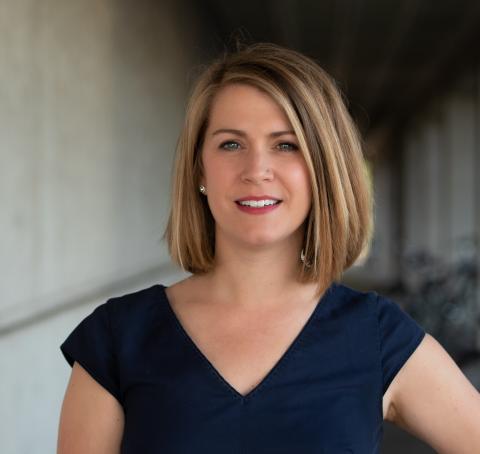Career Insights
Meet Jessica Hughes Wagner

Improving health at UT and beyond has always been a top priority for Jessica Hughes Wagner, recently named the director of strategic initiatives at Healthyhorns. The campus resource provides comprehensive medical care, mental health services, and health promotions tailored to support and sustain student well-being.
Wagner previously served as the deputy director of UT’s Center for Health Communication where she helped teach a popular online course in addition to her strategic duties. She has a lifelong commitment to using communication skills to improve health.
“I'm really passionate about seeing the public health workforce grow and for folks to have stronger skills and communication. Time after time you see a brilliant public health official doing great work. But, if they can't describe the work they're doing or why it's important, it falls flat or they can't get funding.”
Wagner started her UT Austin career as a health promotion coordinator in 2011 after receiving her Master of Public Health degree with a focus in health communication at UNC-Chapel Hill. In 2020, she received the President’s Outstanding Supervisor Award from UT Austin.
Learning to solve problems is key skill
Along with Center for Health Communication director Mike Mackert, Wagner teaches the online course “Thinking Like a Health Communication Problem Solver” for health care professionals. Curiosity, empathy, and a willingness to think about old problems in new ways are some areas discussed.
Emphasis is on transferable, functional skills that apply in any health field. For example, effective visual design and social science research to inform messaging.
The free, online course is 30-45 minutes long and helps participants learn how to think through common health communication challenges and barriers to behavior. The class also offers an overview of the center’s philosophy. “We encourage thinking about the places where we can use our skills and strategy to make the biggest health changes,” Wagner said.
She enjoyed teaching the course because it helps learners think about health communication as a tool and incorporating curiosity and listening as research. Early in her career, she learned that her assumptions about promoting colo-rectal screenings to those over 50 did not match her intended audience. Changing course was uncomfortable, but it was the right thing to do.
“That’s at the core of thinking like a health communication problem solver. Listening to your core audience and doing the necessary research to understand their lived experience. Then having the humility to know that you need to trust what they tell you,” she said.
Director Mackert emphasizes the value of these skills across programs. “I can't say enough how much that course is a very distilled version of who we (the CHC) are and what we want online ed to be. The general idea of ‘thinking like a health comm problem solver,’ informs our approach for all students.”
Student feedback
More than 100 learners took the class within the first year it was offered and reaction has been enthusiastic:
- I liked the sample campaign. It got us thinking about how to apply what we learned in real life.
- It's good to hear real examples and to know that everything was built up from different angles. That way we can see that it's possible to do it in our daily lives.
- I appreciated the extensive examples of messaging campaigns, particularly the one on alcohol use and consent.
Approachable training series is growing
Interest in public health has grown immensely in the last five years, especially in Texas, and demand for education is growing. The center is responding with an expanding catalog of short courses for mid-career professionals.
“We work hard to make it fun and manageable with shorter class times and continuing education credit for most of our courses,” Wagner said.
The Health Communication Training Series has enrolled more than 4,000 learners with backgrounds ranging from public health professionals, pre-med students, physicians, nurses and advertising/media professionals.
“This is a really good way to build your portfolio or beef up your resume as a communicator or a public health worker,” Wagner said. “Bite-size courses make learning accessible for working professionals.”
Insights to Move Your Career Forward
Explore a variety of continuing and professional education topics provided by programs across UT Austin's Extended Campus in this blog, Career Insights. These career-focused articles offer insights to support professionals at all stages of their career. Subscribe to our monthly newsletter to receive Career Insights right in your inbox.
About UT’s Center for Health Communication
- Innovative center shared by the Moody College of Communication and Dell Medical School.
- Established in 2014.
- Supports health initiatives with agencies such as the Texas Departments of State Health Services (DSHS) and Family and Protective Services (DFPS), MD Anderson Cancer Center and the UT System.
- Provides the accessible, affordable Health Communication Training Series and other education opportunities.
- Vision: Improving health through evidence-based communication research and practice.




